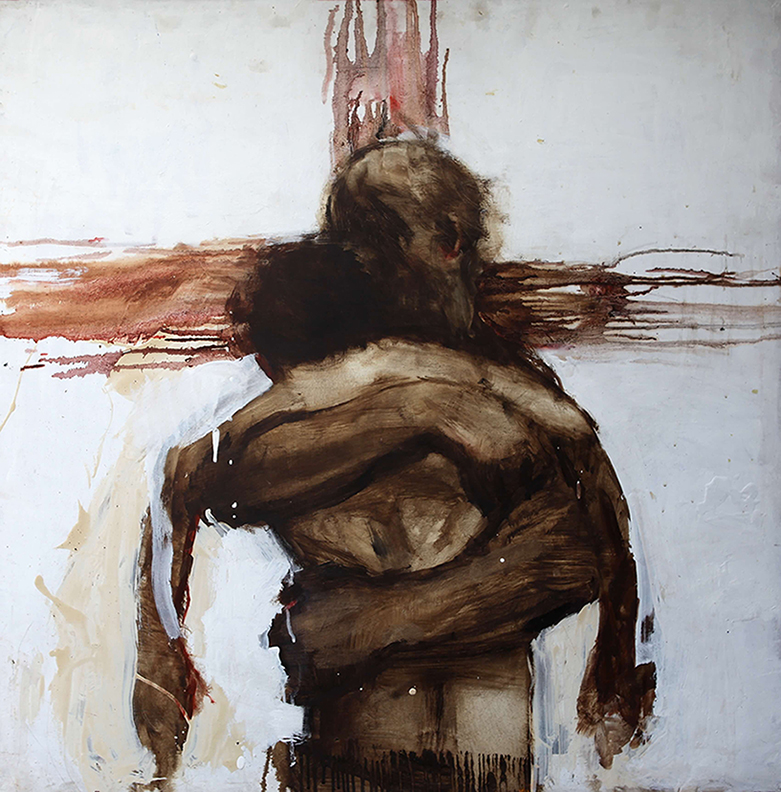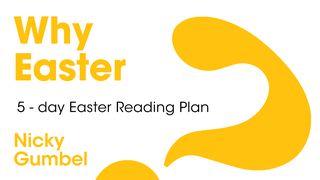Last Words: A Lenten Meditation on the Final Sayings of Christ, Week 3Sýnishorn

While Still Sinners, Christ Died for Us

Bloody Redemption, Charlie Mackesy. Oil on canvas.
“And Can It Be.” Composed by Charles Wesley. Arranged by Dan Forrest. Performed by The Keynote Vocal Group.
Poetry:
“Reconciliation”
by William Butler Yeats
Some may have blamed you that you took away
The verses that could move them on the day
When, the ears being deafened, the sight of the eyes blind
With lightning, you went from me, and I could find
Nothing to make a song about but kings,
Helmets, and swords, and half-forgotten things
That were like memories of you—but now
We'll out, for the world lives as long ago;
And while we're in our laughing, weeping fit,
Hurl helmets, crowns, and swords into the pit.
But, dear, cling close to me; since you were gone,
My barren thoughts have chilled me to the bone.
WHILE STILL SINNERS, CHRIST DIED FOR US
Thank you, Father, for the goodness of this Romans passage, during a week when we focus on the thief on the cross, “The Good Thief.” Thank you also for deepening our understanding through this song, this painting, and this poem.
Charlie Mackesy’s painting Bloody Redemption grabbed my attention from the first moment I saw it. I quickly began to look for other work by Mackesy and found that he has a series of sculptures and paintings based on Jesus' parable of the Prodigal Son. Several paintings from this series describe the scene with words painted on the canvas. He writes in one, “This is the story of the prodigal son. It should really be called the running father." All Mackesy's "prodigal child" pieces feature the embrace of a loving father.
In today’s painting, Mackesy uses this loving embrace to point us to God’s love displayed on the Cross. And this invites us to consider The Good Thief as a Prodigal Son.
We don’t know the details of the crimes that placed the Good Thief on the cross. But he admitted his crucifixion was deserved, before asking that Jesus remember him. As with the Prodigal Son, when things were at their worst, he turned to someone for grace. I want to focus on one line from today’s song "And Can It Be" from the first verse: "Died He for me who caused His pain, for me who Him to death pursued?" Jesus pursued The Good Thief to that place of death: the death of the thief, as well as His own. He was there, at that place and time, for him. That Prodigal Son had a moment to return, and Christ was there for him.
Romans provides a description that accurately describes the Good Thief on the cross: without strength, ungodly (v.6), sinner (v.8), enemy (v.10). But Romans describes all of us. Christ's interaction with The Good Thief was very personal. But we are all prodigals who need to return, repenting of our sin and proclaiming Christ as King.
Mackesy's painting beautifully portrays love and grace. And it shows that reconciliation is messy. Sin is a big problem, so true justification is messy. It has been that way since God performed the first sacrifices in Genesis so the nakedness of Adam and Eve could be covered.Bloody Redemption properly reminds us of this.
Thanks be to God, we can all receive the gifts described in Romans: Christ's death on our behalf (v.6 & 8), justification through Christ's blood (v.9), salvation from the wrath of God (v.9), and reconciliation with God (v.10 & 11).
Yeats’ Redemption poem provides a contrast, telling what redemption can be like in worldly relationships. When his beloved muse returns and “the world lives as long ago,” the remainder of the poem describes a hope that is shallow and anxious.
For an example of true hope, I encourage you to listen to today's music and imagine the lyrics being sung by The Good Thief, our brother, the returning prodigal. This setting by Dan Forrest presents the repeated “can it be?” questions with a musical lift, the way we speak our own questions. The final verse arrives with a triumphant change into a brighter key (moving from Eb to G) and a faster tempo, confidently celebrating, “No condemnation now I dread – Jesus and all in Him is mine!”
Amazing love indeed!
Prayer
Loving Father, praise You and thank You for being the One who watches for our humble return and celebrates with abundant mercy and grace.
Jesus, praise You and thank You for living the life we couldn’t live and paying the price we couldn’t pay. We love you and worship you.
Spirit, praise You and thank You for indwelling us, convicting us of our sin, and guiding us every moment. Fill us and glorify the Father in us and make us more like Christ.
Amen.
Chuck Koontz, MLIS
Librarian for Systems and Special Collections
Adjunct faculty for School of Fine Arts & Communications
Biola University
Ritningin
About this Plan

The Lent Project is an initiative of Biola University's Center for Christianity, Culture and the Arts. Each daily devotion includes a portion of Scripture, a devotional, a prayer, a work of visual art or a video, a piece of music, and a poem plus brief commentaries on the artworks and artists. The Seven Last Words of Christ refers to the seven short phrases uttered by Jesus on the cross, as gathered from the four Christian gospels. This devotional project connects word, image, voice and song into daily meditations on these words.
More








